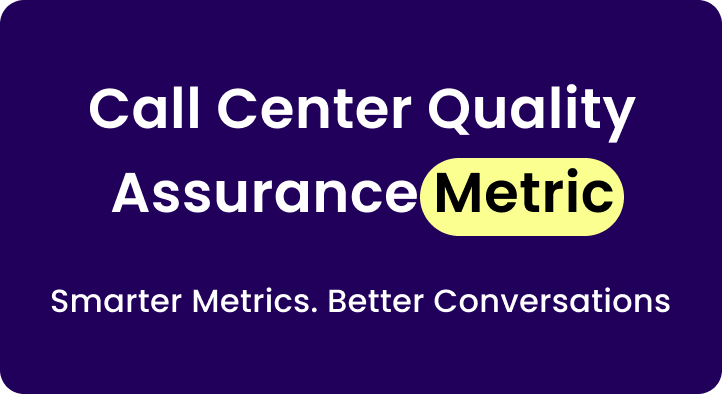Quick Summary
Call center coaching drives measurable results when it’s fast, focused, and data-driven. Modern coaching in call center environments reduces agent turnover, improves CSAT scores, and cuts average handle time. This guide covers benefits, techniques, implementation best practices, and how AI-powered tools like Enthu.AI streamline coaching efforts.
Is your traditional call center coaching failing?
Still stuck in the “let’s talk about your calls for an hour” era? No wonder your agents are zoning out.
Here’s what call center coaching actually looks like in 2025: Fast. Focused. Friction-free. No marathon feedback dumps. No generic motivational speeches. Just real-time insights agents can actually use.
And yeah, it can even be enjoyable.
This guide breaks down benefits, techniques and best practices of call center coaching to transform average performers into all-stars.
Ready to kill the coaching snoozefest? Let’s do this.
Table of Contents
A. What is Coaching for Call Center Agents?
Call center coaching is the ongoing process of guiding agents through meaningful conversations that build skills, boost confidence, and improve performance. Unlike simple feedback, coaching empowers agents to self-reflect, practice, and grow in a supportive environment.
Think of it as a growth game:
- Coaching = conversations, not corrections.
- Coaching = asking, not telling.
- Coaching = building skills, not handing out lectures.
B. Benefits of call center coaching for agents
Effective call center coaching tools and methods deliver measurable benefits that extend far beyond basic performance metrics. Here are some top benefits of coaching in call centers.
1. Increased customer satisfaction
Well-coached agents deliver superior customer experiences that directly impact satisfaction scores.
When agents receive targeted feedback on empathy, active listening, and problem-solving, they’re better equipped to understand customer needs and provide tailored solutions.
Organizations with robust coaching programs see huge improvements in CSAT scores. In fact, 80% of customer service organizations now use CSAT as their primary metric to gauge and improve customer experience.
2. Improved agent performance and engagement
Coaching call center agents strategically transforms average performers into stars.
Data-driven coaching helps agents understand how their behaviors impact KPIs like average handle time, first call resolution, and conversion rates.
At Enthu.AI, we’ve seen clients reduce average handle time by 12% while simultaneously improving resolution rates through focused coaching on specific call moments.
3. Increased confidence and morale
When coaches provide guidance, support, and opportunities for skill development, this enhances agent job satisfaction and leads to higher morale.
Agents who receive regular, constructive feedback feel valued and supported, creating a positive cycle of continuous improvement.
The “before & after” review technique particularly boosts confidence by showing agents tangible proof of their progress.
4. Less stress and burnout
Effective call center coaching methods reduce agent stress by providing clarity, structure, and continuous support.
Rather than leaving agents to struggle independently, coaching creates a safety net where challenges become learning opportunities.
This supportive environment is critical in an industry where burnout contributes to annual turnover rates exceeding 40% in some sectors.
5. Contributes to a positive brand image
A well-coached team that consistently provides excellent service boosts customer satisfaction scores and reduces customer churn, leading to a stronger reputation and increased revenue.
When agents deliver confident, empathetic, and effective service, every interaction becomes a brand-building opportunity.
This matters more than ever – 78% of consumers have backed out on intended purchases because of negative experiences.
C. 7 Proven call center coaching techniques that drive results
Great coaching isn’t about long lectures or vague advice.
It’s about smart, repeatable techniques that actually help agents grow.
Here are 7 tactical coaching methods that work like magic in high-performing call centers:
1. The call breakdown method
Instead of reviewing an entire 6–8 minute call, pick one or two crucial moments and coach just that.
Think of it like reviewing the game-winning play in a football match—not the whole 90 minutes.
Focus on pivotal points like the opening, objection handling, tone shifts, or the final close.
This helps agents zero in on what really matters without feeling overwhelmed by the full conversation.
Let’s say an agent struggled during a price objection. You replay that 25-second snippet where the customer pushed back, pause, and ask the agent how they’d respond differently.
Enthu.AI helps by tagging such moments using snippets, so you can pull them up in seconds. This creates targeted learning that sticks better than generic feedback.
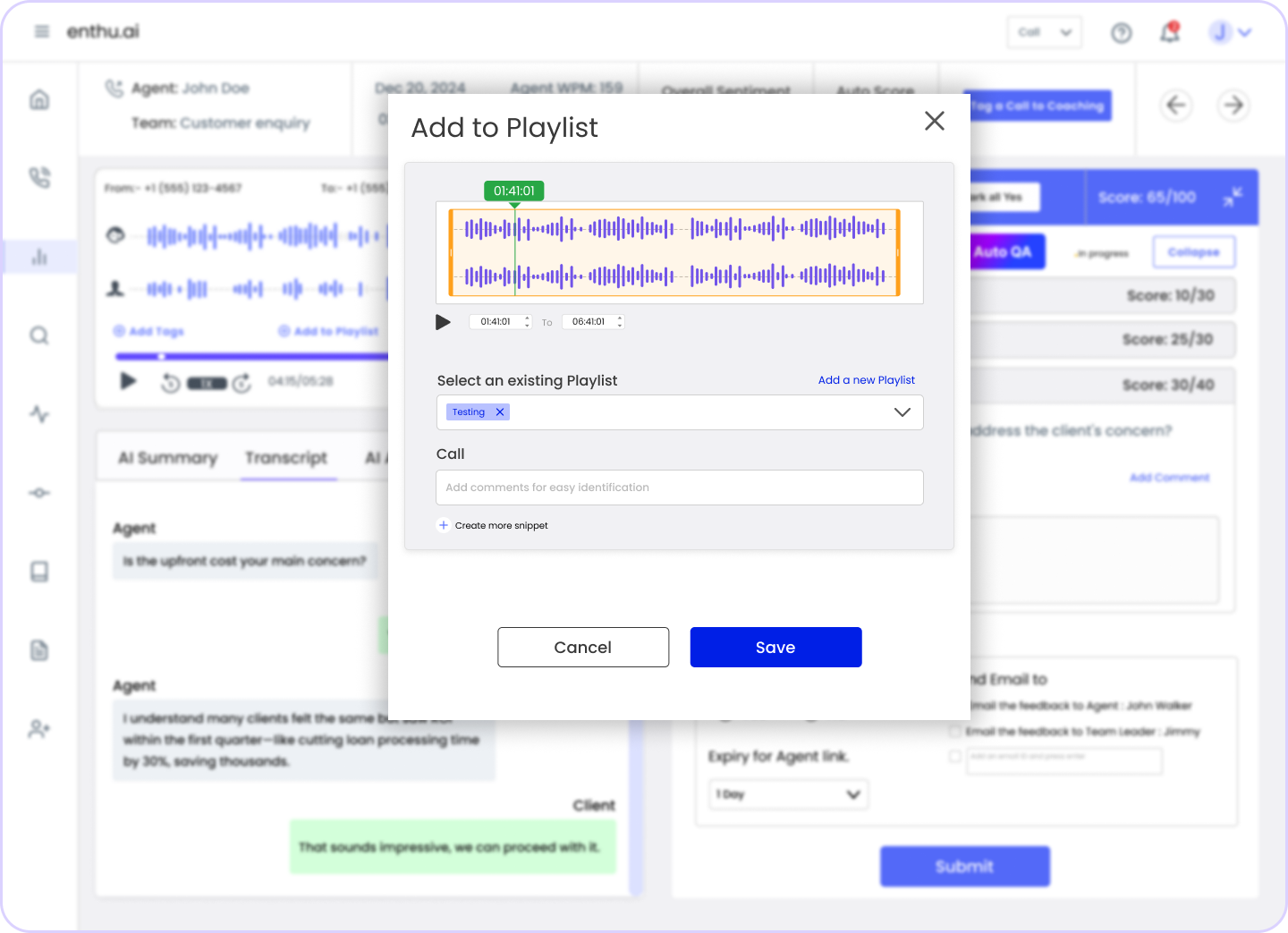
Use Enthu’s transcript search to find objection-heavy calls fast.
2. Scorecard-based coaching
Use quality scorecards not as a report card, but as a coaching compass.
The goal isn’t just to grade, but to spot trends. A dip in the script adherence score over a week could indicate coaching opportunities.
Reviewing this regularly helps managers make data-backed decisions instead of guessing.
Hey Rahul, I noticed your script adherence dropped from 93% to 86% over three days. Let’s look at where you’re going off-script and whether it’s helping or hurting the flow.
You can filter calls by scorecard category and drill into where the drop occurred.
Coaching feels less like correction and more like collaborative performance tuning.
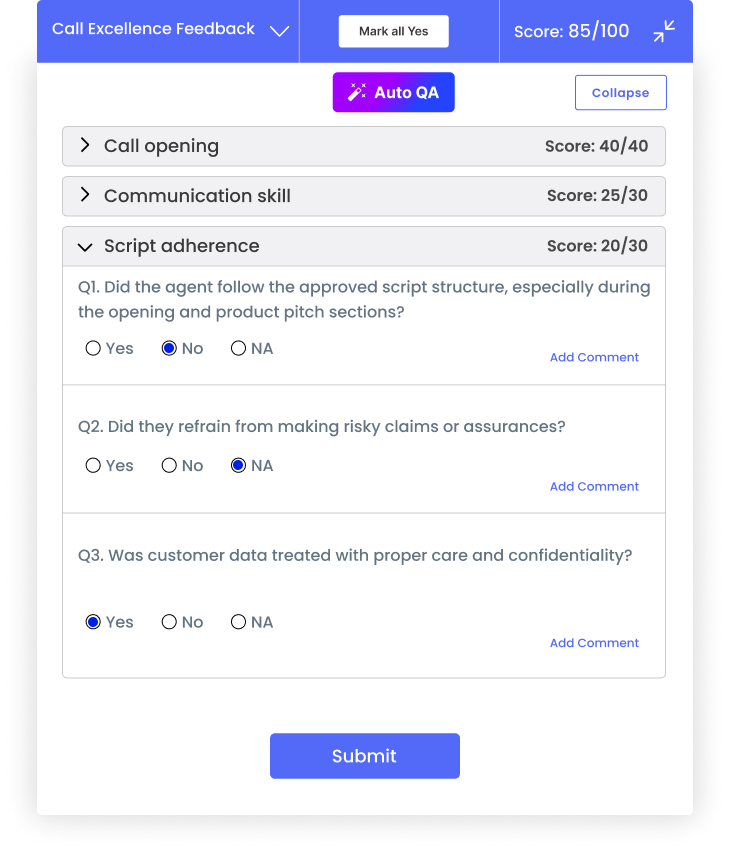
3. Silent shadowing
Let agents shadow top performers—but silently. No meetings.
No lectures. Just curated call recordings from high-performing agents.
Ask them to listen and identify 3 things they’d want to try. It turns passive listening into active learning and reduces dependence on managers.
You assign an agent three calls where top reps handle customer complaints. They notice how each rep uses pauses, tone, or specific phrasing to de-escalate the situation. Afterward, you ask: “Which part did you like best? Can you try that on your next call?”
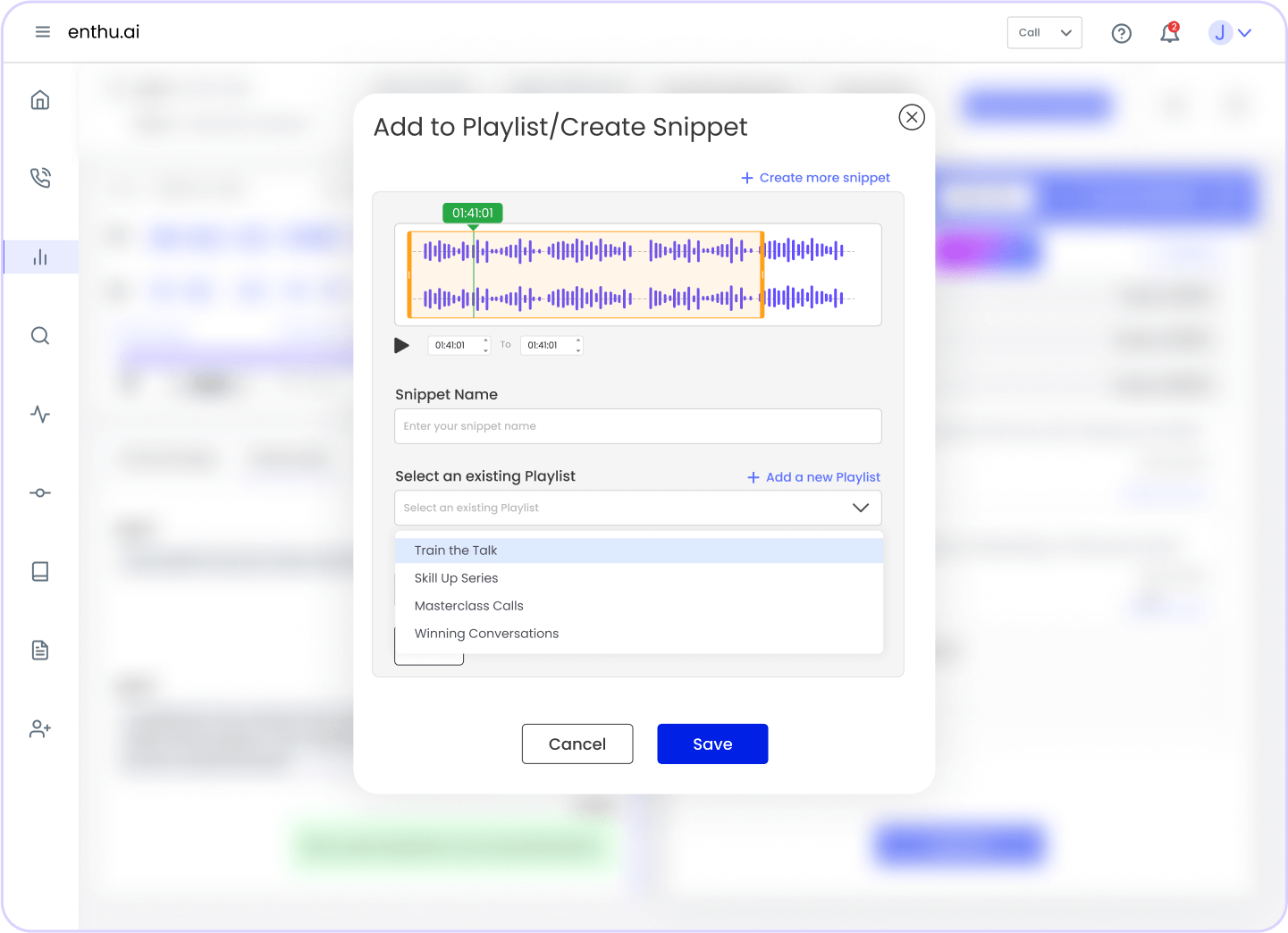
4. The “before & after” review
Instead of only focusing on what went wrong, show progress.
Take an older call recording and compare it with a recent one from the same agent.
Let them hear the difference in tone, structure, and confidence. It boosts morale and reinforces learning by highlighting what’s actually improved over time.
You pull up a call from 30 days ago where the agent fumbled during the pitch. Then, you play a recent one where they nailed it. Ask: “What’s changed in your approach?” or “What would you still tweak?” This technique isn’t just motivating—it proves that coaching is working.
3. Micro-coaching moments
Forget waiting for the monthly review.
Real learning happens when feedback is instant and bite-sized.
Micro-coaching is about dropping 1–2 line insights after a call, while it’s still fresh in the agent’s mind. This builds a habit of continuous improvement without disrupting workflow.
An agent finishes a call. You send: “Love how you paused after the customer’s objection—felt very natural.
That 15-second message can have more impact than a full sit-down.
You can quickly drop notes right after a flagged call—directly via Slack or email—without scheduling anything.
Over time, this method compounds into better habits.
6. Call center coaching with KPIs in context
Coaching should always be tied to real numbers, or it becomes abstract.
When you show agents how their behavior impacts KPIs—like AHT, CSAT, or conversion rate—it becomes easier to connect the dots between coaching and outcomes.
Example
Your average handle time increased by 45 seconds this week, but your LTR improved. That tells me you’re taking more time to understand the customer. Let’s find a sweet spot that keeps both metrics in check.
At Enthu.AI, we’ve worked with call centers where agents couldn’t see the connection between their tone and CSAT scores. After implementing KPI-linked coaching dashboards, those same centers saw customer satisfaction improve by 18% within 60 days because agents finally understood what to change and why.
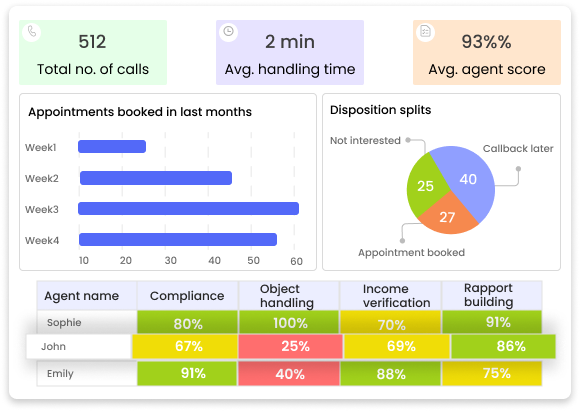
7. Coaching with follow-ups built in
One coaching session isn’t enough. The magic happens in the follow-up.
Set a micro-goal after each session and revisit it after 3–5 days. This creates accountability and a rhythm of consistent learning.
Teams that follow up on coaching see 33% higher improvement in agent performance (Gartner).
Example
You say: “For the next 5 calls, try to end with an open-ended question. Let’s review two of those by Thursday.” Enthu.AI lets you tag calls for follow-up review and let’s you create different coaching sessions.
D. The 15-minute coaching framework that actually works
Raise your hand if you’ve ever postponed coaching because you didn’t have time.
(Yeah, same.)
But here’s the plot twist: Coaching doesn’t have to be a 60-minute calendar-eating monster.
Sometimes, 15 minutes is all you need to spark real improvement—if you do it right.
Here’s a simple, no-fluff framework that’ll help you run punchy, purposeful coaching sessions (even between back-to-back meetings).
Step 1: Prep (3 minutes)
Pull 1-2 calls aligned to the goal using QA insights or Auto QA filters.
Use your QA insights or Enthu’s Auto QA filters to shortlist calls worth discussing—no more random picks!
Example If the goal is “Improve call openings,” pick a call where the agent skipped the greeting or jumped right into scripting. Play the exact snippet; prompt reflection (“What did you notice?”). The goal isn’t to trap them—it’s to spark self-awareness. Let them reflect. They’ll often spot issues before you say a word. And that’s a coaching win. 1 praise + 1 improvement; tie to the moment. What worked: “Your tone was super warm—especially during the hold transfer. That’s gold.” What to improve: “Let’s pause before offering a solution next time. Ask one more probing question first. It helps customers feel heard.” Use one highlight + one area of improvement. That’s it. Define a measurable micro-goal and schedule a follow-up. For your next 5 calls, I want you to pause for 2 seconds after every objection and then respond using the empathy framework we discussed. Set expectations. Then schedule a follow-up coaching session to check progress. That’s it. 15 minutes. It’s fast. It’s focused. It works. The secret sauce? Consistency. Because even the best framework fails if it only shows up once a quarter. So you’ve realized that giving feedback once a month over coffee isn’t cutting it. Good news: Coaching isn’t one-size-fits-all—and your agents aren’t clones either. Let’s break down the real coaching formats that work in today’s fast-paced call centers (without making your reps yawn through it): Classic but still gold. Think of this as your focused, heart-to-heart session. You go deep into one rep’s strengths, struggles, and specific calls. No interruptions. No team chatter. Just two people and real talk. Hey Sam, remember that call with the customer who wanted to cancel? Let’s unpack how you handled objections—it was 80% perfect, but there’s this one moment… When to use it: Fix the pattern, not the person. If you’re spotting the same issue across multiple reps—like missed greetings or low empathy scores—bring them together. Not to shame, but to learn together. You can even role-play call snippets and turn it into a live workshop. We noticed that greeting consistency dropped across the board last week. Let’s hear a few variations and brainstorm stronger openers. Bonus: It builds team accountability. Reps coaching reps = powerful. Sometimes, the best feedback doesn’t come from managers—it comes from peers who get it. Set up “buddy reviews” where two reps swap calls and give each other constructive feedback. You’ll be surprised how much insight they share. I noticed you paused for just the right amount of time when the client was frustrated—that calmed things down instantly. I’m gonna try that too. Use it to: Because growth starts with self-awareness. Let reps listen to their own calls with scorecards. Ask them to reflect and rate themselves. You’ll find many of them already know where they slipped—this just makes it real. I totally rushed that closing line. I didn’t even ask if they needed help with anything else. Noted. (Yup, you can coach… while you sleep.) Manual reviews take time. A lot of time. That’s why platforms like Enthu let you create automated coaching sessions—no more jumping between tools or digging through random call snippets. You decide what needs improvement (say, “Objection handling” or “Better rapport-building”), and Enthu helps you: It’s structured, it’s scalable, and it saves you hours—while making coaching more consistent than ever before. At Enthu.AI, our customer success specialists and coaching experts have spent hundreds of hours analyzing successful call center coaching implementations across dozens of contact centers. Through rigorous testing, client feedback, and performance data analysis throughout 2024 and 2025, we’ve identified the practices that consistently drive the best results. Here are the 10 most effective call center coaching best practices backed by real-world data and our hands-on experience: Establish a predictable coaching rhythm. Brief weekly check-ins outperform lengthy quarterly reviews by maintaining momentum and addressing issues while they’re fresh. Consistent 15-minute touchpoints demonstrate organizational commitment to agent development while preventing skill decay. Ground every coaching conversation in objective metrics extracted from conversation intelligence and automated quality assessments. When feedback stems from quantifiable data – empathy scores, compliance adherence, resolution rates, agents can’t dismiss it as opinion, making behavioral change more achievable. Enthu.AI’s Auto QA with GenAI analyzes 100% of interactions, surfacing precise improvement opportunities that manual review would miss. Establish transparent performance benchmarks that directly connect coaching activities to business results like customer satisfaction, handle time efficiency, and first-contact resolution. When agents understand the “why” behind coaching recommendations through tangible KPI movement, engagement and buy-in increase dramatically. Track progress visually through performance dashboards that highlight individual trajectory against team averages. Recognize that agents absorb information differently. analytical minds thrive on data visualization while relational learners respond to customer stories and role-play scenarios. Adapting your delivery method to match individual learning preferences accelerates skill acquisition and demonstrates genuine investment in personal growth. Strategic call observation, whether live or recorded – uncovers micro-moments where slight adjustments would create outsized impact on customer outcomes. Rather than critiquing entire interactions, isolate specific exchanges that exemplify coaching opportunities or best practices worth replicating. Enthu.AI’s AI transcripts with speaker separation eliminate hours of manual listening, instantly directing you to the exact 30-second segments requiring attention. Prompt agents to critique their own performance before formal coaching discussions, fostering ownership and self-awareness that external feedback alone cannot achieve. When agents independently identify improvement areas, they arrive at coaching sessions primed for collaborative problem-solving rather than defensive justification. Transform coaching from isolated manager-agent transactions into an embedded organizational mindset where peers, team leads, and supervisors naturally exchange developmental feedback. When coaching flows continuously through daily operations rather than confined to scheduled appointments, skill-building accelerates exponentially. Master the art of balanced feedback delivery. Pair every developmental suggestion with genuine recognition of demonstrated strengths to maintain morale while driving improvement. Effective feedback is immediate, behavior-specific, and accompanied by clear action steps rather than vague directives. Create safe practice environments where agents rehearse high-stakes situations – Irate customers, complex objections, technical escalations before encountering them in live interactions. Simulation builds muscle memory and confidence that classroom training cannot replicate, particularly for emotionally charged exchanges. Close the coaching loop by systematically measuring whether interventions translate into measurable skill advancement across quality scores, efficiency metrics, and agent confidence indicators. Treat coaching itself as an iterative process requiring ongoing refinement based on effectiveness data – double down on what works, eliminate what doesn’t. Enthu.AI’s coaching analytics reveal direct correlations between specific coaching activities and subsequent performance shifts, proving ROI to stakeholders. Even the best coaching programs encounter obstacles. Here are four common challenges and how to address them: Managers struggle to find time for coaching call center agents amid daily operational demands. The average QA review takes 45-60 minutes per call, making consistent coaching nearly impossible. Solution: Implement AI-powered coaching tools like Enthu.AI that reduce QA time by 90% through automated scoring and snippet identification. Coaching delayed by days or weeks loses impact as agents can’t connect feedback to specific interactions. Without real-time call monitoring, managers miss coachable moments that could prevent recurring issues. Solution: Use conversation intelligence software that flag coachable moments immediately and enable micro-coaching within minutes of the call. Agents may perceive coaching as criticism rather than development, especially when feedback lacks specificity or data backing. Inconsistent coaching practices create confusion and disengagement. Solution: Build feedback around objective data from quality scorecards, show before-and-after progress, and involve agents in setting their own improvement goals. Manual coaching doesn’t scale – contact centers with 100+ agents can’t provide consistent, personalized feedback to everyone. Generic group training fails to address individual skill gaps. Solution: Leverage automated coaching sessions that deliver personalized, data-driven feedback at scale while freeing managers to focus on high-touch coaching for complex situations. At Enthu.AI, we’ve seen dozens of contact centers struggle with the same coaching challenges: too many calls to review, not enough time, and no clear way to measure what’s working. We built our platform to solve exactly these problems. How Enthu.AI Transforms Call Center Coaching “Enthu.AI impacted our appointment set rates by 5% & reduced new agent onboarding time by half by making our sales coaching much more efficient. He added, “What I like the most about Enthu.AI is its easy and simple interface. All the calls are displayed in front of me, and the search filters make it easy to route to meaningful conversations without spending much effort. I can review calls and share feedback instantly with my agents.” – Wayne, Sales Team Leader, Yopa Ready to transform your coaching? Request a Demo to see how Enthu.AI can streamline your contact center coaching efforts. 1. How do you coach a call center agent ? 1. Coach your service team strategically 2. Micro-coach them throughout the day 3. Have a specific purpose 4. Start off on the right foot 5. Teachable skills 6. Creating an action plan 7. Role Plays 2. What is coaching in a call center? Call center coaching is the process of providing guidance, feedback, and training in order to improve agent performance and reach their potential, with a focus on customer service, sales, and communication skills. 3. How can I improve myself as a call center agent? To improve as a call center agent, focus on improving your communication skills, product knowledge, and customer service skills. Practice active listening, ask questions, and seek feedback to continuously improve your performance.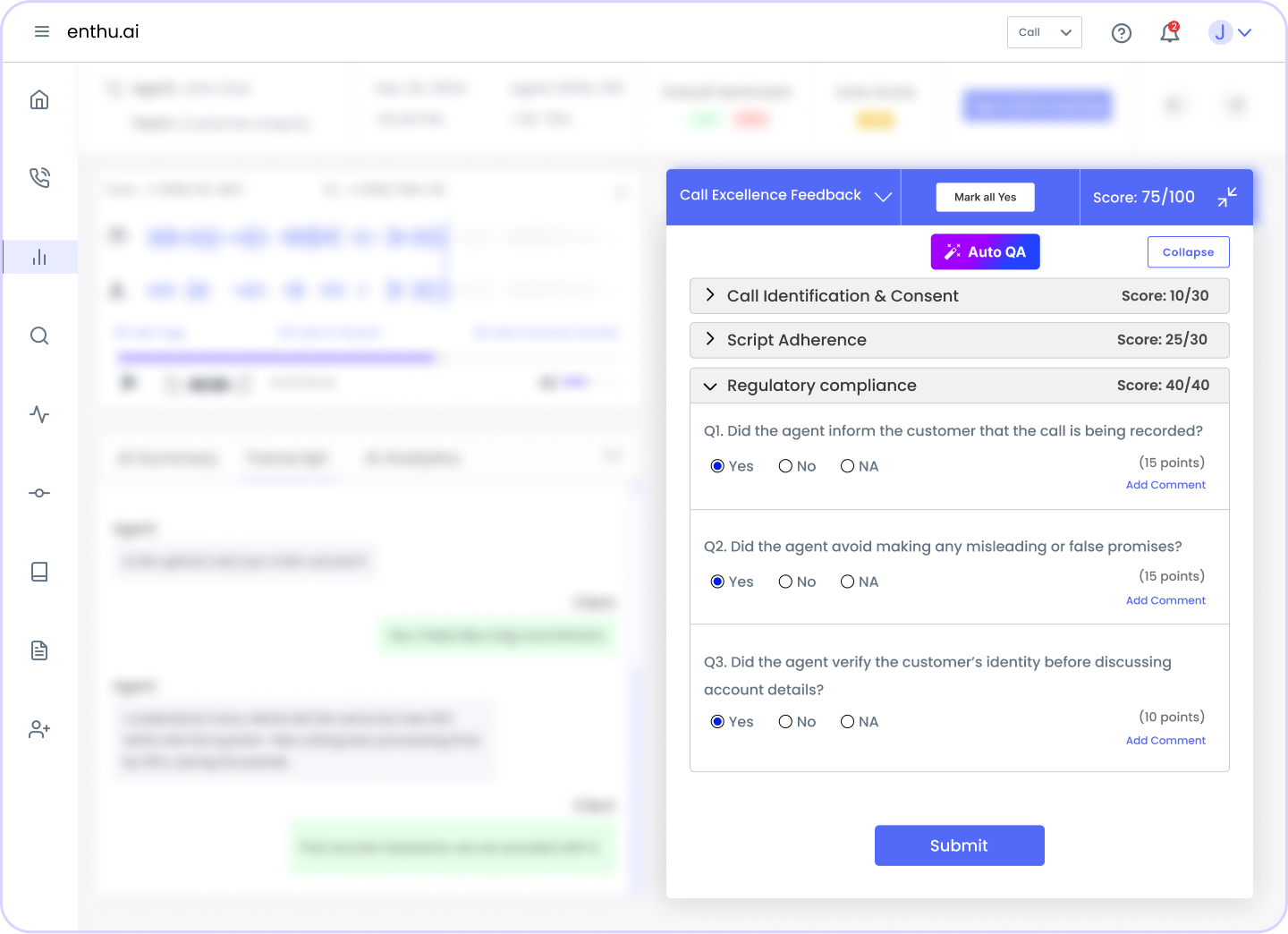
Step 2: Listen together (4 minutes)
Step 3: Targeted feedback (4 minutes)
Step 4: Agree on 1 actionable takeaway (3 minutes)
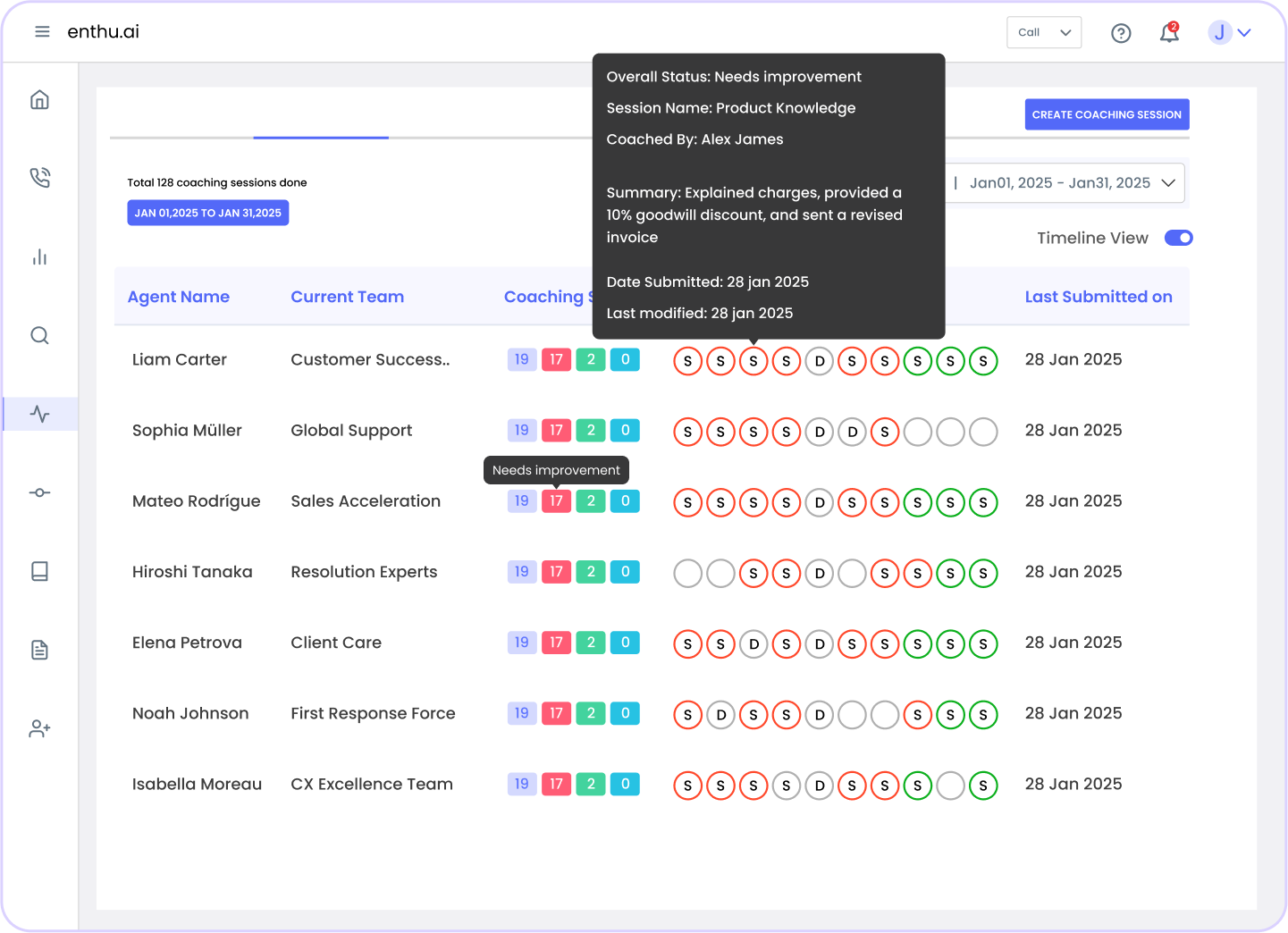
E. Types of call coaching you should be using
1. One-on-One coaching
2. Group coaching
3. Peer-to-peer coaching
4. Self-coaching
5. Automated coaching sessions
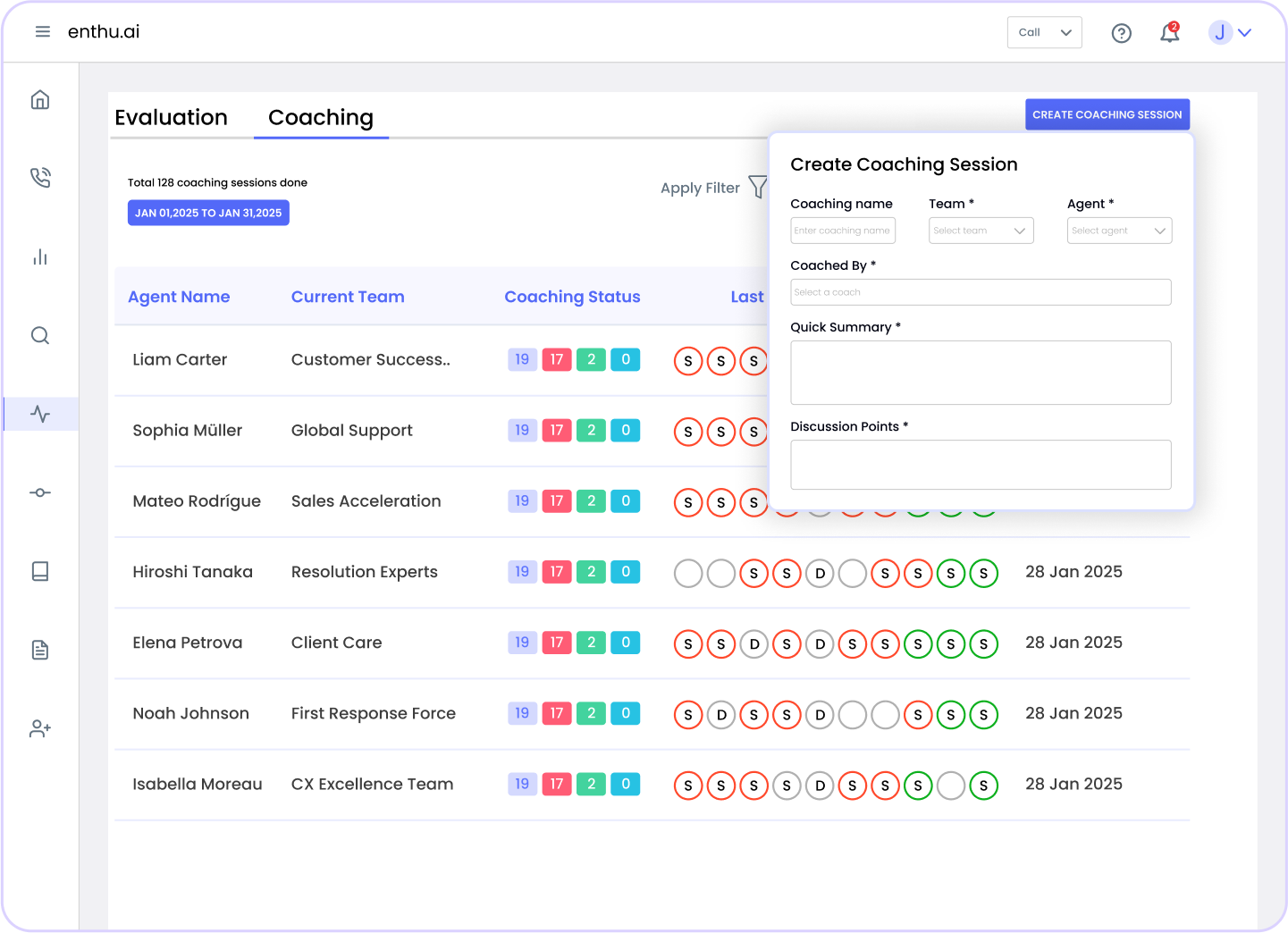
F. Call center coaching best practices
Best Practice Key Benefit Implementation Difficulty Impact on Performance Conduct Regular Coaching Sessions Consistency builds skills Low High Build Feedback Around Data Removes subjectivity Medium Very High Set Clear Performance Monitoring KPIs Aligns coaching to outcomes Low High Personalize Coaching Approaches Addresses individual needs Medium Very High Practice Call Monitoring Identifies coachable moments Low Medium Encourage Self-Evaluation Builds self-awareness Low Medium Cultivate a Coaching Culture Makes coaching continuous High Very High Provide Constructive Feedback Motivates improvement Medium High Role Play Challenging Scenarios Builds confidence Medium High Monitor and Evaluate Performance Tracks coaching effectiveness Medium High 1. Conduct regular coaching sessions
2. Build feedback around data
3. Set clear performance monitoring KPIs
4. Personalize coaching approaches
5. Practice call monitoring
6. Encourage self-evaluation
7. Cultivate a coaching culture
8. Provide Constructive Feedback
9. Role play challenging scenarios
10. Monitor and evaluate performance
G. Common call center coaching challenges
1. Time constraints and competing priorities
2. Lack of real-time visibility
3. Resistance to feedback and Change
4. Scaling coaching across large teams
H. Streamline your call center coaching efforts with Enthu.AI
FAQs
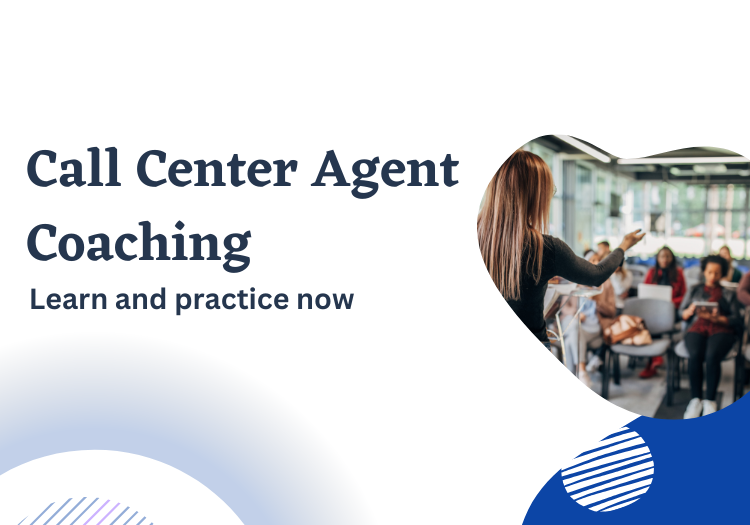
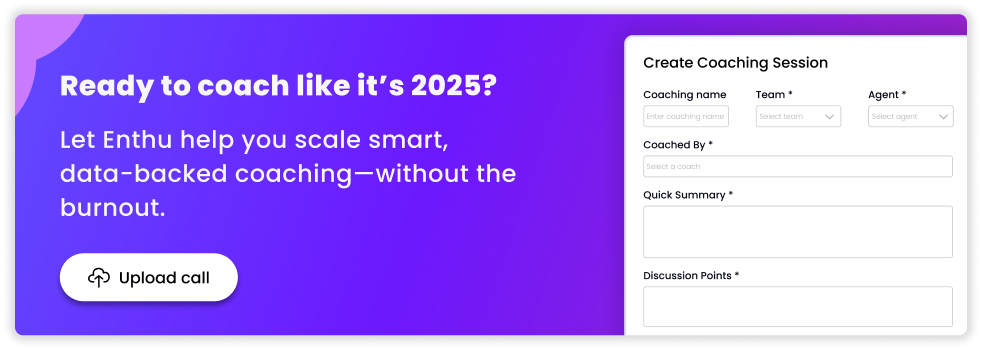


 On this page
On this page
